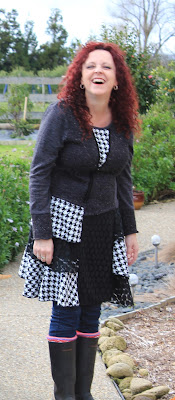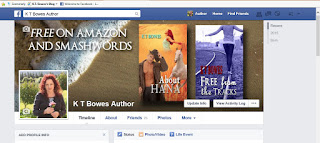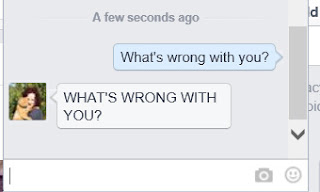A
lot of arguments happen online. The media is full of stories of ‘online
bullying’ and cyber oppression. For someone who grew up without a mobile phone,
it seems an incredible phenomenon. If you don’t like what’s on your TV screen
it’s an easy matter to flick the off button. Surely it’s the same with
computers, isn’t it?
The
answer is no, it’s actually not that simple.
It’s personal!
The
reason seems to be in the personal
nature of social media. We all get offended by stuff we see on the TV but in
the most part, we know it’s not aimed specifically at us. It has a general
audience who share a whole range of opinions and viewpoints. This isn’t the
case with social media.
Taking
Facebook purely as an example, we tend to align ourselves with other people of like-minded persuasion, whether that’s readers of mystery fiction,
lovers of Star Trek or chocolate addicts. On Facebook, I’m a member of a local
residents’ group, an international book club and a local group which supports
people living with food intolerance. This is in addition to those I admit into my
inner circle and call ‘friends’.
It’s
a much narrower field than TV, radio or any of the other outside influences I
allow into my world and group members have an automatic inroad to my inner
circle. The people I associate with have things
in common. In my world, my friends are the people I allow to view my trials
and tribulations, my bad days and my good. The word ‘friend’ implies they will
take me at face value, excuse the bad attitudes I occasionally exhibit and sit
the journey through with me until the good times come around again. My friends
used to be my coffee buddies, but moving to the other side of the planet made
that difficult for some of us, although the sentiment is still there for many and
‘virtual Skype coffees’ are the closest we get for years at a time.
Who are my friends?
The
word ‘friend’ probably seemed like a good idea when Facebook was in its
planning stages, but the connotations are far more wide reaching than the
label. When someone befriends us on Facebook or another form of social media,
we make the mistake of believing they’ll rescue us when our car breaks down on
the motorway, turn up with a casserole and tissues when a relative dies, or
babysit at a moment’s notice when we’re really stuck. The sad reality is the
click of a button and the gathering of another ‘like’ when we post about our
dreadful day. If we’re really lucky, we might be rewarded with an appropriate
emoticon.
The Tragic Unfriending
This has become one of the most effective ways of upsetting someone or making a point. In the real world, you might drift away from someone because that season is over. But on Facebook, that season is never over. You have to stay 'friends' for the rest of your natural life, so they can 'like' the post your tearful spouse puts up when you exit this mortal coil. Unfriending is the gravest insult possible because it means they can no longer see your stuff and you're sending out a very clear message, "I don't want to see yours."
Does anyone else think this is ridiculous?
I regularly cull my 'friends' on my personal Facebook page. If you don't talk to me or 'like' my stuff, I kinda don't want you there. I wouldn't want you peering through my windows without knocking on my front door because that's just weird. I have a 'like or leave' policy for that very reason.
A guide to the subtle
insult
1. CAPITAL LETTERS.
If you really want to upset someone, make your point using caps.
2. !! The Exclamation Mark !!
This has numerous meanings. In fiction it
illustrates emphasis but in social media, it conveys anything from sarcasm,
through irritation, to outright anger.
3. (Brackets)
Sarcasm hides in (brackets) to nullify the sharpness of the point the
writer is attempting to make. It’s a sly way of de-emphasising someone’s
exasperation with your inferiority.
Outright aggression
We’ve all seen outright aggression on social
media. I once watched a video on YouTube which popped up in my newsfeed. It was
from a carpark security camera in America and showed someone pulling into a
parking space and wiping out about seven parked cars. Out of interest I turned
to the comments and they began harmlessly enough. Some people found it funny,
then someone mentioned a medical emergency and linked the news report which
claimed an elderly lady had a heart attack in a carpark. Yeah, so the laugh kinda died
in our throats. A few minutes later and my jaw hung slackly as I read the
vitriolic crap which ensued. How did we get from a mildly funny oopsie video to
the kind of physical threats of violence that involved broken windows and other
more painful suggestions of bodily harm? Who are these people that seem intent
on lighting the touch paper with the proverbial match and then dancing around
the resulting fire? Are they bored, frustrated, mischievous or insane?
People talk about internet trolls. For a long
time I imagined a slippery green water dweller who popped out from underneath
bridges and ate innocent little goats. I’ve subsequently met a few. They’re
actually regular people with some kind of axe to grind on anyone who opposes
their often, very radical view. I’ve learned to my cost that these people have
no interest in me personally. If I’m in their way, I’ll be smushed underfoot in
their quest to pull the legs off the next spider who doesn’t quite run fast
enough. Trolls are not always easy to spot but once you do, don’t engage. Move
quickly away, block them and don’t go back for more.
Misunderstanding
It’s
far too easy to have misunderstandings in a conversation when you can’t see
someone’s body language. I know it sounds obvious, but the need for emphasising
speech using brackets, exclamation marks or emoticons isn’t necessary when they
can lightly slap your arm, grin cheekily or pull a cute face to make you laugh.
The ‘silent treatment’ might just be someone logging off, getting busy or
having to get dinner. If you think you’ve upset someone, ask them. And vice
versa.
Stay
out of contentious conversations and walk away from nasty threads. Don’t be
tempted to ‘gang up’ on someone just because everyone else is. Not everyone is
good at making their thoughts or beliefs sound coherent in black and white, so
don’t judge someone on what they type. You didn’t at school, so why would you
now as an adult? If you can’t see their face when they say it, it’s not safe to
stake your brand or reputation on it. Beware the threads that go off at a
tangent. They are often the ones that get out of control. They’re like floating
sticks down a river; there’s no telling where they’ll end up.
Be
mindful out there and stay safe. Not everyone is who you think they are. We're all wearing a mask and let's be honest, sometimes it slips a little.
 |
| You kinda weren't meant to see the gumboots... |
#Facebook #etiquette #online




No comments:
Post a Comment